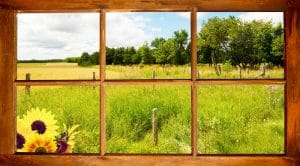
Living in the country has great appeal for most of us. Space, peace and quiet, big home, big yard, place to raise your family… are but a few of the things that appeals to us. If you are considering buying a rural property, there are a few things that you should consider.
When lenders are considering a mortgage, it’s always about managing risk. Higher risk, higher rates. The risk that you’ll pay them back as agreed and they don’t have to seize the asset and sell it to recoup their investment. Here are some points to remember:
- Mortgage lenders don’t really want to own your property, because foreclosing on your property means it will take time and effort to get some of their money back.
- With rural property, depending on remoteness of location and condition of the property, it could take months to sell when compared to the quicker sale for a home in the city.
Mortgage lenders don’t like waiting years to get their money back on a non-performing loan, so they have implemented special rules related to rural properties to reduce their risk.
One of the most important things to do when buying a rural property, is to hire a real estate agent knowledgeable about rural properties and local zoning laws. The names of the zones and the related details are determined by each local government, so there may be variation between communities throughout each province.
Land: A rural property, for most lenders and their home appraiser, includes only one house, the garage and 10 acres in the valuation. Any additional buildings will not be considered. This policy applies to both conventional and insured mortgages.
Many lenders will not mortgage properties that are zoned agricultural. Why? Because as we mentioned, lenders are all about risk. Taking a farm away from a farmer means taking their livelihood away, so the government has implemented many obstacles to prevent this.
Water & Septic: In order to live in a house, you need to be able to drink the water and flush the toilet. In the country you need to take care of these yourself. When buying, if you are not on municipal water, your water will probably come from a well. Many lenders will ask for a potability and flow test for the well, because a house without water is very hard to sell. Chances are your sewerage may be in a septic tack. You need to have the septic system inspected by a qualified septic inspector. Both the well equipment and septic system can be very expensive to repair or replace. Thus, when you buy in a rural location, be sure you include these with your conditions.
Appraisal: Your lender will want to see an appraisal to ensure the value of your land. The appraised value may come in lower than expected, because rural properties do not turn over as quickly as city properties. Be prepared for the inspection to cost more than it cost you in the city, since the appraiser needs to travel farther to see the property.
Wood Energy Technology Transfer (WETT): If there’s a wood stove or wood-burning fireplace, you may want to make your offer conditional on receiving a satisfactory WETT inspection report, which confirms the safeness and correct installation of the wood-burning unit.
Buy (or check into) Title Insurance: Many buyers don’t realize that farmland, particularly larger, more remote tracts of land, may have been used as a dump-site for toxic chemicals. Buying title insurance, or checking the title for the specific property, will let you know if the property has been listed as a toxic dump-site, or a hazardous waste site.
House/Content/Fire Insurance: Lenders want to ensure you have insurance in place to protect their investment. If you can’t get insurance – it has the potential to be a serious problem, since your mortgage company may not advance the closing funds. Living in the country is great, however you are also far from fire hydrants and fire stations which will mean more money on home insurance.
If you are considering buying a home in a rural area, remember that there are two important things that you need to get first, a real estate agent knowledgeable about rural properties and a mortgage broker that can find the right mortgage option for you.
Original article: www.dominionlending.ca


